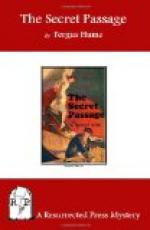“I think you are very wise,” said Caranby unexpectedly, “let the case be, Mr. Jennings.”
“What did Miss Saxon tell you?” asked the detective irrelevantly.
Mallow sat down and in a calm voice detailed all that he had learned from Juliet. “So you see it throws no light on the subject.” Had Mallow mentioned the time at which Juliet asserted she saw him climb over the wall a new light would certainly have been thrown. But he purposely omitted this, and simply said that Juliet had seen him. “I told you I was there, Jennings,” he added. “Quite so,” said the detective. “Certainly, nothing new has come out.”
“Well, then leave the case alone.”
“I fear I shall have to, now that the Rexton house has been burnt down,” and Jennings related in his turn what had taken place.
Cuthbert listened moodily. “You see,” he said, “everything is against us. I only wanted the mystery cleared up so that Juliet might marry me, but now that she wishes to do so, without searching further, I am not going to do anything else.”
“Nor I,” said Jennings sadly, “nothing is to be learned. The case will remain a mystery to the end of time.”
Caranby rose and took Cuthbert’s arm. “You young men are faint-hearted,” he said, with a shrug.
“If you want my opinion, Mrs. Octagon killed her sister. A fatal woman, I tell you both—a fatal woman.”
“And a clever one,” said Jennings gloomily, “she has baffled me.”
CHAPTER XIX
SUSAN’S DISCOVERY
Although Jennings appeared to acquiesce in Mallow’s suggestion that the case should be abandoned, he had not the slightest intention of leaving the matter alone. His professional pride was irritated by the difficulties, and he swore that he would in some way learn the truth. Moreover, the matter did not only deal with the death of Miss Loach, but with the discovery of a coining gang. From various obvious facts connected with the Crooked Lane crime, Jennings made sure that such a gang was in existence, and that the factory had been in the unfinished house. Now that the house was burnt down, it would seem that the coiners had lost their city of refuge, and would probably give up their nefarious trade. As the gang— judging from the number of false coins circulated during the past five years—had been in existence for a long time, it was probable that the members had made sufficient money to retire from so dangerous a business.
“I wonder if the house was set on fire by this arrested man, out of revenge,” thought Jennings, as he dressed to go out, “or whether the gang, finding things were growing dangerous since the death of Miss Loach, ordered him to destroy the factory? I can hardly think that, as to preserve the secret, Miss Loach was assassinated. It is not likely that after paying so terrible a price, such destruction would be agreed upon. Certainly the factory may be removed to another place. Humph! I wonder if I can trace it. The best thing for me to do will be to go to Rexton and look at the ruins.”




